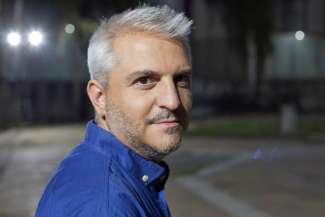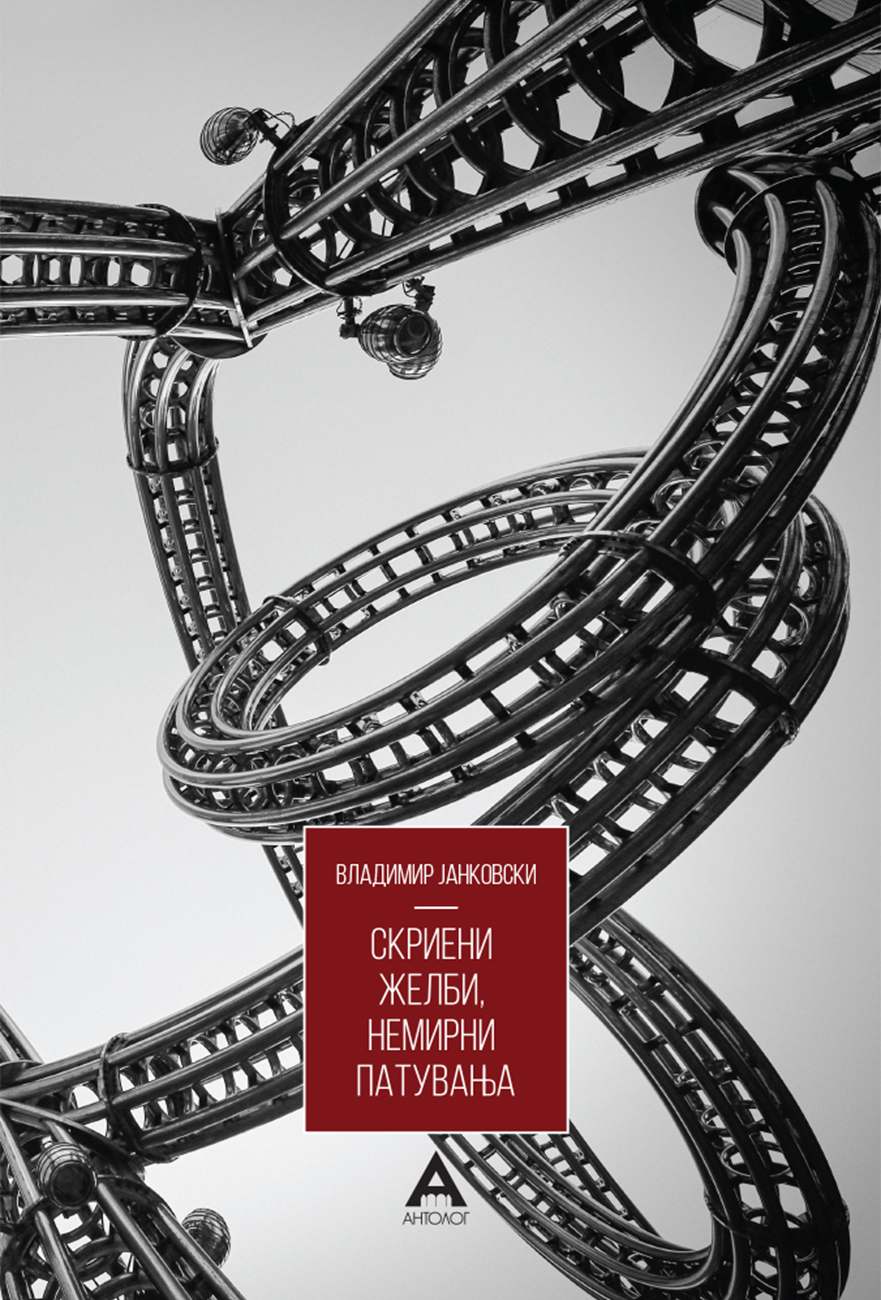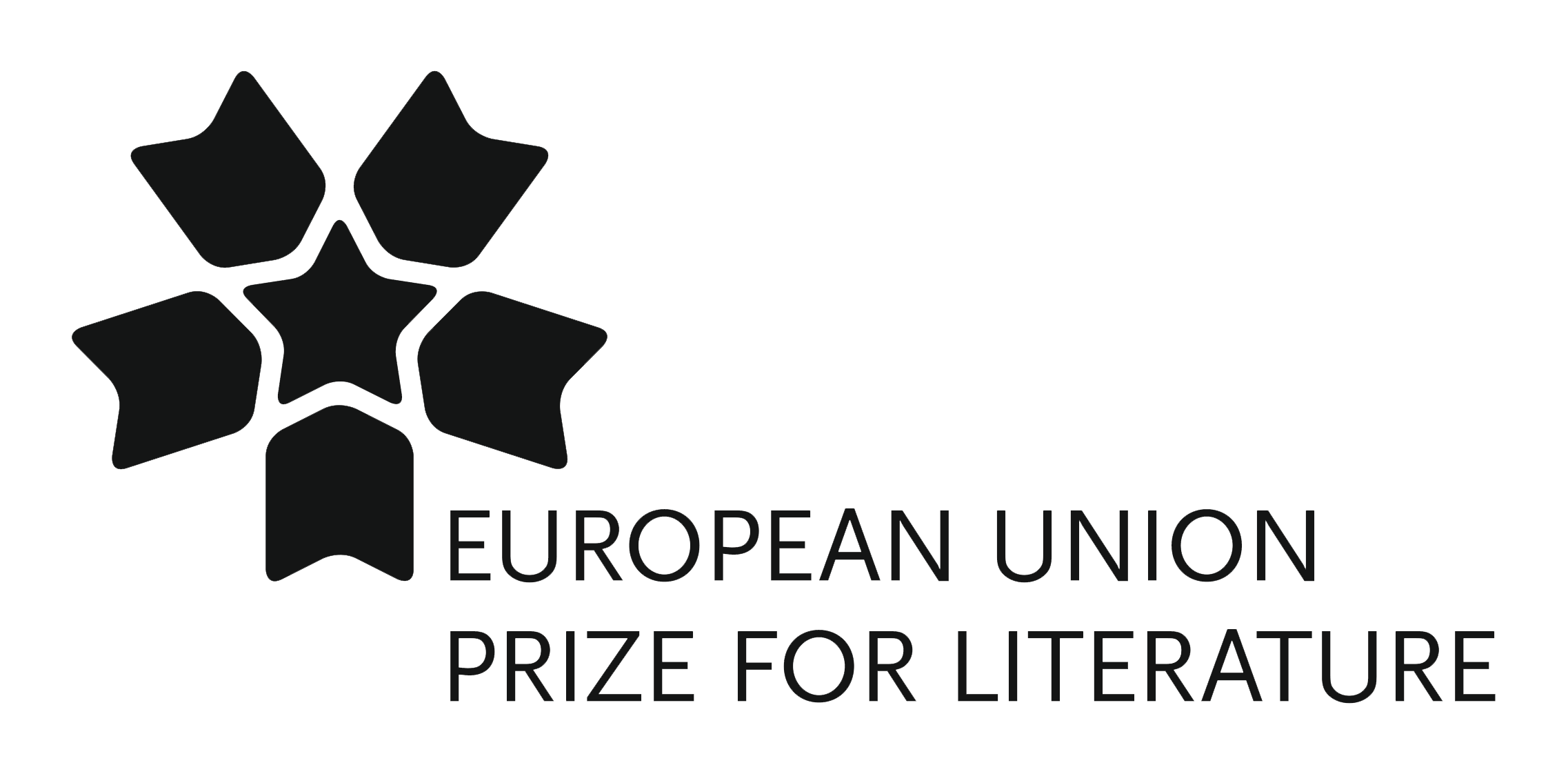

Vladimir Jankovski (1977) has graduated General and Comparative literature at the Faculty of Philology „Blaze Koneski“ in Skopje. He worked as an editor in several publishing houses. He has published 3 novels: Hidden Desires, Restless Travels (2020), Invisible Loves (2015), and Eternal Present Time (2010). For the novel Hidden Desires, Unrest Travels he was awarded with the “Novel of the Year award” and for Invisible Loves he was awarded with “Racinovo Priznanie award” for the best prose book. Hidden Desires, Restless Travels and Invisible Loves were representatives of Republic of North Macedonian for international “Balkanika” award. He is active in the field of literary translations. For the translation of the novella The Penelopiad by Margaret Atwood he was awarded with “Zlatno pero”, award given by the Association of literary translators of North Macedonia.
Agent / Rights Director
Publishing House
Translation Deals
- Serbian : Treči Trg
- Slovenian : Goga
Excerpt
Бистра и Мартин, 1
Мартин ги подзатвора очите за уште посилно да го почувствува мирисот на жената што стои во лифтот пред него.
Лифтот треба да одработи уште четири ката.
Силно го вдишува мирисот што телото го создава.
Во следниот момент вратата на лифтот се отвора, жената динамично зачекорува надвор.
Таа засекогаш ќе исчезне во градот, претворена во сеќавање за едно можно вкрстување.
Мартин никогаш нема да дознае како се вика, која е нејзината професија, какви се нејзините опсесии.
Таа се вика Анастасија Димеска, 43-годишна фармацевтка. Не ја сака премногу својата работа. Помлада сестра во семејство на лекари. Како тинејџерка таинствено била опседната со најодвратните деца од населбата. Три години живее со Алекс, агент за недвижности и фанатик за италијански фудбал. Анастасија ништо не сака на фанатичен начин. Себеси се смета за некоја што умее добро да го одреди обемот на нештата. Тоа е точно. Често во мислите одговара на замислени интервјуа. Жали за: тоа што не може да живее неколку различни животи истовремено. Желба: наутро да го избира својот живот како што луѓето ја избираат облеката што ќе ја носат. Кога е пред огледало: ужива во лицето што ја гледа.
Павел, 1
Павел седи на металните седишта и на екранот ги набљудува имињата на градовите. На седиштето спроти него една Азијка втренчено, речиси без никаква дистанца меѓу очите и екранот, скрола по таблетот. До неа, нејзината пријателка или само сопатничка, внимателно ги набљудува лицата на луѓето што од безбедносната контрола се пробиваат до чекалницата. Сосредоточена е на нивните лица, движења, ги набљудува како во нив да ќе најде одговор на прашање што одамна си го поставила.
Изобилие на мигот. Така Павел би можел да ја опише оваа ситуација во која мноштво луѓе поминуваат низ топлото грло на аеродромот.
Павел продолжува немарно да разгледува, тој не е некој чиј поглед долго време може да се задржи на едно место. Ги набљудува луѓето што седат и најголемиот број од нив втренчено гледаат во своите телефони приклучени на најпопуларната социјална мрежа. Зјапаат во баналноста на туѓите животи.
Аеродромот е мелница на илјадници човекови егзистенции, кои во следниве неколку часа ќе се доближат, ќе поминат низ заедничката цедилка, а потоа процедени од другата страна ќе се распрснат насекаде. Ќе биде вистинско чудо доколку некои од тие приказни, допрени со посредство на ова неместо со стандардизирани елементи, повторно се вкрстат. Тоа невкрстување за Павел отсекогаш било ослободувачко.
Одеднаш, девојката што седеше до таблет-девојката станува, изодува бавен круг околу чекалницата, активност типична за ваквите ситуации, и застанува пред него. Тоа е првата нетипичност досега.
– Извинете, дали може да ве прашам нешто – изговара на добро извежбан англиски јазик.
– Да, секако – неговиот англиски е за нијанса полежерен.
– Можете ли да ми кажете која е вашата приказна?
– Молам?
– Вашата приказна. Во неколку реченици. Не повеќе од десет.
Погледот на Павел кажува дека му е потребно дополнително објаснување. Непознатата го разбира значењето на тој поглед. Изгледа како личност добро тренирана за да ги разбира потребите на другите луѓе. Затоа од внатрешниот џеб на палтото вади мобилен што ќе послужи како снимач на звук. Секое нејзино движење е во хармонија со соопштението што следува.
– Најчесто луѓето ме прашуваат да им дадам објаснување. Им кажувам дека секогаш кога имам можност за тоа, одам на патување надвор од мојата татковина, родена сум во Шведска. На тие патувања снимам случајно избрани луѓе. Секако, ако се согласат со тоа. Ги снимам како рас- кажуваат некоја своја приказна. За нив, за некој близок, за нешто што ги интригира. Претходно, само треба да ги соопштат името, презимето и градот од кој доаѓаат, некои ги прашувам и за годините... но тоа не е задолжително. Тоа правам – ги собирам нивните приказни за самите себеси. Ви пречи ли ако и вие ми ја кажете? Ќе ви пречи ли ако ве снимам?
Ја гледа азиската Швеѓанка.
Сакај го мигот, биди добар кон него, препушти му се без да очекуваш ништо за возврат.
– Не, ама имам еден услов...
– Секако!
– Ќе го направам тоа што го барате од мене, ама на мојот јазик, на македонски јазик. Јас сум Павел Фирфов од Скопје, Македонија. Една земја во Европа, поточно во Југоисточна Европа, не знам дали некогаш сте слушнале или биле...
– Да. Сакам географија. Македонија – Охридско Езеро...
– Да, така...
Тогаш гласот од звучниците го најавува качувањето на авионот за Истанбул, летот на Павел.
– И вие одите за Истанбул?
– Не, Рим.
– Значи, имам малку повеќе од две минути за да ви го раскажам она што го барате од мене?
Девојката го подава мобилниот кон Павел.
Давид, 1
Давид лежи на креветот во својата соба и го набљудува плафонот на кој мајка му уште пред тој да се роди насликала небо кон кое полетуваат девојки облечени во широки фустани, а наместо раце имаат перки од риби. Со години го гледа овој плафон без да му стане досаден или да добие желба да го пребојадиса.
До него на портокаловиот кревет е поставен инструментот. Левата рака благо го допира лакираното тело.
Има 22 години и утре е еден од најважните денови во неговиот живот – концертот кој ќе означи што понатаму ќе се случува со него и со неговиот инструмент.
Бистра и Мартин, 2
На улицата градот нервозно ги камшикува лицата на своите жители. Го прави тоа со звуците што ги произведува, со глетките што ги создава, со воздухот што луѓето се принудени да го дишат.
Мартин застанува пред деловниот центар примајќи ги жестоките удари. Добро ги познава и, уште повеќе, ги сака. Во последно време тој и може да му биде издржлив единствено на тој начин – преку неговата суровост.
Иако во овој момент трајна врз лицето на Мартин е само трагата од мирисот на жената во лифтот.
Уршка Ловренц од Ново Место, Словенија; биографија во една реченица, во второ лице
Ти си онаа што мисли дека секој човек во себе носи по еден мал чудак, а животот се претвора во тага кога дозволуваме тој чудак во нас пречесто да спие.
Бистра и Мартин, 3
Бистра го праќа прегледот во ексел што го работеше цело утро, па погледнува кон големиот канцелариски прозорец.
Ноќниот дожд во соработка со правот на стаклото исцртал фигура: жена со пет глави.
Станува од столот, канцеларијата е празна, колегите се на пауза. Го залепува лицето врз студеното стакло. Нејзината е шестата глава. Или таа станува жена со шест глави.
Градот долу е тивок и каприциозен, разгален љубовник без јасна претстава како сака да ја заврши ноќта.
Бистра со показалецот исцртува една реченица врз студеното тело на стаклото.
Никој никогаш нема да ја прочита оваа реченица.
Тоа не ѝ пречи – таа не е некоја што сака да остава траги, да биде запаметена, спомнувана.
Excerpt - Translation
Translated from Macedonian by Christina Kramer
Bistra and Martin, 1
Martin half closes his eyes to catch the scent of the woman standing in front of him in the elevator more intensely.
The elevator has another four floors to descend.
He breathes in deeply the scent emanating from her body.
The next moment the elevator door opens, the woman steps out briskly.
She will disappear into the city forever, turned into a memory of a possible intersection.
Martin will never know her name, her profession, or her obsessions.
Her name is Anastasija Dimeska, a 43-year old pharmacist. She doesn’t much like her work. A younger sister in a family of doctors. As a teenager she was secretly obsessed with the most repulsive children in their neighbourhood. She’s been living for three years with Alex, a real-estate agent and an Italian football fanatic. Anastasija doesn’t like anything in a fanatical way. She thinks of herself as someone who knows how to give the right weight to things. The true one. In her imagination she answers questions to made-up interviews. She is sad about: the fact that she can’t live various lives simultaneously. Her desire: to choose a life in the morning the way people choose what clothes to wear. When she’s in front of a mirror: she takes pleasure in the face looking back at her.
Pavel, 1
Pavel sits on one of the metal chairs and studies the names of the cities on the screen. In the chair opposite him an Asian woman is scrolling on her tablet, staring with almost no distance between her eyes and the screen. Next to her, her friend, or merely a traveling companion, is attentively studying the faces of the people who come into the waiting area from airport security. She is focused on their faces, their movements; she studies them as if she’ll find in them an answer to a question she asked a long time ago.
An abundance of the moment. That is how Pavel would describe this situation where so many people are funneling through the warm gorge of the airport.
Pavel continues to look around absently, he’s not someone whose gaze can be held for long in one place. He studies the people sitting there and the majority of them stare fixedly at their telephones logged on to the most popular social media. They stare at the banality of other people’s lives.
The airport is a mill of thousands of people’s lives, which, over the course of the next several hours, will draw closer, will pass through a collective sieve, and then, once sifted to the other side, will disperse in all directions. It would be a true miracle if some of those stories, unfolding through the mediation of this non-place with its standardized features, were to intersect again. For Pavel, this non-intersection has always been liberating.
Suddenly, the girl sitting next to tablet-girl stands up, makes a slow circle around the waiting area, an activity typical for this situation, and stops in front of him. That is the first atypical thing thus far.
“Excuse me, may I ask you something,” she says in well-rehearsed English.
“Yeah, sure,” his English more casual in tone.
“Can you tell me your story?”
“I’m sorry?”
“Your story. In several sentences. Not more than ten.”
The look on Pavel’s face says that he needs more of an explanation. The unknown woman understands the meaning of that look. She seems like a person quite well rehearsed in understanding the needs of other people. So from an inside coat pocket, she takes out a cell phone which will serve as an audio recorder. Each of her movements is in harmony with the information that follows.
“People usually ask me to give them an explanation. I tell them that whenever I can, I take a trip outside of my native country, I was born in Sweden. On these trips I record randomly selected people. That is, of course, if they agree. I record them telling one of their stories. About themselves, about someone close to them, about something that intrigues them. First, they just provide their first and last names, and the city they come from, I ask some of them their age… but that isn’t necessary. That’s what I do – I collect their stories about themselves. Would it bother you if you told me yours? Would it bother you if I record you?
He looks at the Asian Swede.
Love the moment, be good to it, indulge in it, and expect nothing in return.
“No, it wouldn’t, but on one condition …”
“Of course!”
“I’ll do what you’re asking, but in my language, in Macedonian. I am Pavel Firfov from Skopje, Macedonia. A country in Europe, or more precisely in Southeastern Europe, I don’t know if you’ve ever heard of it or been …
“Yes. I love geography. Macedonia – Lake Ohrid …”
“Yes, that’s right …”
The voice over the loudspeakers announces the boarding of the flight to Istanbul, Pavel’s flight.
“Are you also going to Istanbul?”
“No, Rome.”
“So that means I have less than two minutes to tell you what you’re asking?”
The girl moves the cell phone towards Pavel.
David, 1
David is lying on the bed in his room observing the ceiling on which, before he was born, his mother painted a sky with girls in wide dresses flying towards it, but instead of arms they have fish fins. He has been looking at this ceiling for years without it becoming boring or wishing to repaint it.
Beside him, there’s an instrument lying on the orange bed. His left hand is gently touching its varnished body.
He is twenty-two years old and tomorrow is one of the most important days of his life; the concert which will determine what will happen to him and to his instrument.
Bistra and Martin, 2
On the street the city angrily lashes the faces of its residents. It does this with the sounds it produces, the views it creates, the air the people are forced to breathe.
Martin stops in front of the business centre taking the city’s harsh blows. He’s well acquainted with them, and what’s more, he likes them. Lately, this is the only way he can endure the city – through its cruelty.
At this moment, however, what is enduring on Martin’s face is the trace scent of the woman in the elevator.
Urška Lovrenc from Novo Mesto, Slovenia: biography in one sentence, in the second person
You’re the one who thinks that we each carry inside ourselves a little weirdo, and life turns to grief when we allow that weirdo inside us to sleep too often.
Bistra and Martin, 3
Bistra sends the overview in an Excel file which she worked on all morning and looks at the large office window.
The night rain, in collaboration with the dust on the glass, has drawn an image: a woman with five heads.
She gets up from her chair, the office is empty; her colleagues are on break. She glues her head to the cold glass. Hers is the sixth head. Or she has become a woman with six heads.
The city below is quiet and capricious, a spoiled lover with no clear idea how he wants the night to end.
With her index finger, Bistra traces a sentence on the cold body of the glass.
No one will ever read this sentence.
That doesn’t bother her, she isn’t someone who wants to leave traces, to be remembered, to be thought about.
